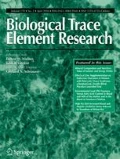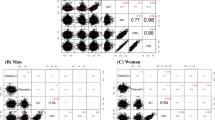Abstract
Copper (Cu) deficiency has been reported to influence lipid metabolism, but the effects in humans are controversial. To evaluate the effects of 8 mg Cu/day supplementation (as copper sulfate) for 6 months on the lipid profile and hepatic function of apparently healthy men. The design was randomized double-blind placebo-controlled clinical trial. Subjects and methods: 60 apparently healthy males aged 18–51 years were randomly assigned to Cu supplementation (n = 30) or placebo (n = 30). There was a nonsignificant reduction of 17 % in total cholesterol in both groups after supplementation. A 23 % nonsignificant reduction was observed in LDL cholesterol levels in the supplemented group. There was a nonsignificant increase of HDL cholesterol of 47 and 66 % in the control and supplemented groups, respectively. Triglyceride levels over 150 mg/dl were found in 17 subjects supplemented and 13 controls at baseline and decreased after supplementation to seven and eight subjects, respectively. There were no effects on serum Cu concentration or ceruloplasmin (protein) and hepatic transaminases. Supplementation of 8 mg Cu for 6 months had no effect on lipid profile of apparently healthy Chilean men with adequate Cu status.
Similar content being viewed by others
References
Uauy R, Olivares M, Gonzalez M b (1998) Essentiality of copper in humans. Am J Clin Nutr 67(5 Suppl):952S–959S
Tümer Z, Møller LB (2010) Menkes disease. Eur J Hum Genet 18:511–518
Tao TY, Gitlin JD (2003) Hepatic copper metabolism: insights from genetic disease. Hepatology 37(6):1241–1247
Weisstaub G, Medina M, Pizarro F, Araya M (2008) Copper, iron and zinc status in moderately and severely malnourished children recovered following WHO protocols. Biol Trace Elem Res 124(1):1–11
Klevay LM, Inman L, Johnson LK et al (1984) Increased cholesterol in plasma in a young man during experimental copper depletion. Metabolism 33:1112–1118
Reiser S, Powell A, Yang CY, Canary JJ (1987) Effect of copper intake on blood cholesterol and its lipoprotein distribution in men. Nutr Rep Int 36:641–649
Turnlund JR, Scott KC, Peiffer GL, Jang AM, Keyes WR, Keen CL, Sakanashi TM (1997) Copper status of young men consuming a low-copper diet. Am J Clin Nutr 65(1):72–78
Huster D, Lutsenko S (2007) Wilson disease: Norjust a copper disorder. Analysis of a Wilson disease model demonstrates the link between copper and lipid metabolism. Mol Biosyst 3:816–824
Al-Othman AA, Rosenstein F, Lei KY (1993) Copper deficiency increases in vivo hepatic synthesis of fatty acids, triacylglycerols, and phospholipids in rats. Proc Soc Exp Biol Med 204:97–103
Al-Othman AA, Rosenstein F, Lei KY (1994) Pool size and concentration of plasma cholesterol are increased and tissue copper levels are reduced during early stages of copper deficiency in rats. J Nutr 124:628–635
Alarcón-Corredor OM, Carnevalí de Tatá E, Reinosa-Füller J, Contreras Y, Ramírez de Fernández M, Yánez-Domínguez C (2000) Changes in serum lipids in rats treated with oral cooper. Arch Latinoam Nutr 50:249–256
Jones AA, DiSilvestro RA, Coleman M, Wagner TL (1997) Copper supplementation of adult men: Effects on blood copper enzyme activities & indicators of cardiovascular disease risk. Metabolism 46:1380–1383
Alarcón-Corredor OM, Guerrero Y, Ramírez de Fernández M, D'Jesús I, Burguera M, Burguera JL, Di Bernardo ML, García MY, y Alarcón AO (2004) Effect of copper supplementation on lipid profile of Venezuelan hyperlipemic patients. Arch Latinoam Nutr 54:413–418
Medeiros D, Milton A, Brunett E, Stacy L (1991) Copper supplementation effects on indicators of copper status and serum cholesterol in adult males. Biol Trace Elem Res 30:19–35
DiSilvestro RA, Joseph EL, Zhang W, Raimo AE, Kim YM (2012) A randomized trial of copper supplementation effects on blood copper enzyme activities and parameters related to cardiovascular health. Metabolism 61:1242–1246
Barr SI, Murphy SP, Agurs-Collins TD, Poos MI (2003) Planning diets for individuals using the dietary reference intakes. Nutr Rev 61(10):352–360
National Cholesterol Education Program (NCEP) Expert Panel on Detection, Evaluation, and Treatment of High Blood Cholesterol in Adults (Adult Treatment Panel III) (2002) Third Report of the National Cholesterol Education Program (NCEP) Expert Panel on Detection, Evaluation, and Treatment of High Blood Cholesterol in Adults (Adult Treatment Panel III) final report. Circulation 106:3143–3421
Duh S, Denis J (2005) Laboratory reference ranges values. Pp 98–112. http://www.stedmansonline.com/webFiles/Dict-Stedmans28/APP17.pdf. Accessed 14 May 2013
Rebolledo A (1998) Encuestas Alimentarias. Rev Chil Nutr 25:28–34
Gattás V (2008) guía de composición nutricional de alimentos naturales, de la industria y preparaciones chilenas habituales. Universidad de Chile-INTA, Santiago
Copper (2006) Dietary reference intakes: the essential guide to nutrient requirements. The National Academies, Washington, DC
Acknowledgments
We would like to thank Angélica Letelier for his excellent technical assistance and Sotiris Chaniotakis for his work editing the English of this manuscript. This study was supported by the International Copper Association and FONDECYT no.1070665 and FONDECYT no.1110099.
Author information
Authors and Affiliations
Corresponding author
Rights and permissions
About this article
Cite this article
Rojas-Sobarzo, L., Olivares, M., Brito, A. et al. Copper Supplementation at 8 mg Neither Affects Circulating Lipids nor Liver Function in Apparently Healthy Chilean Men. Biol Trace Elem Res 156, 1–4 (2013). https://doi.org/10.1007/s12011-013-9823-4
Received:
Accepted:
Published:
Issue Date:
DOI: https://doi.org/10.1007/s12011-013-9823-4




